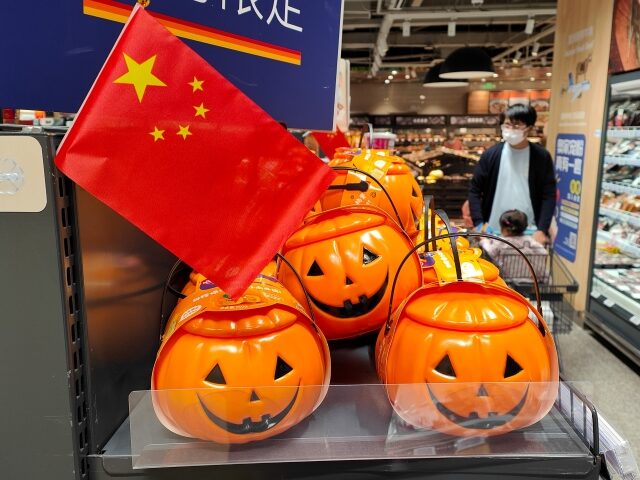China’s state-run Global Times on Thursday bemoaned the collapse of demand from Western countries for “festive products for coming Halloween,” while taking some solace in brisk orders for “Christmas consumption.”
The Global Times quoted Chinese market analysts who attributed the striking 40-percent drop in sales of Chinese-made Halloween merchandise to the fact that most Halloween orders come from the U.S. and Europe, while Christmas is more widely celebrated in Asia and Latin America.
The analysts also suggested Halloween is suffering more from inflation eating away at consumer spending, while Christmas is a more “resilient” holiday.
“Unlike Halloween, Christmas – as a must-spend festival – is clearly more powerful in terms of generating sales,” asserted Cai Qinliang, secretary-general of China’s Industry Association of Christmas Supplies.
Cai said that even while Halloween sales plunged 40 percent against 2021’s numbers, sales of Christmas goods are up by eight to ten percent.
Chinese online retail giant Alibaba suggested American and European consumers are more accustomed to searching for bargains when Christmas shopping, while they might be turned off by high prices for Halloween items in a high-inflation recessionary economy.
The U.S. National Retail Federation (NRF) had a very different take on the Halloween season than China’s analysts. In early October, the NRF said it was projecting $10.6 billion in Halloween spending for 2022, compared to $10.1 billion in 2021.
“The big driver this year was a return to pre-pandemic participation levels,” said NRF senior director Katherine Cullen.
The federation attributed some of the increased sales to high demand for Halloween costumes as more people planned to resume post-pandemic holiday parties, and the fortunate occurrence of Halloween on a Monday this year, making it the capper to a three-day party weekend.
Cullen noted that consumers seem to be keeping holiday celebrations in their budget, even as inflation squeezes their disposable income.
“They may be thinking about saving money in other parts of their lives, maybe taking fewer trips to the store, cutting back on other discretionary purchases. But when it comes to celebrations so far this year, they’re protecting those in a way that makes sense for them,” she said.

COMMENTS
Please let us know if you're having issues with commenting.